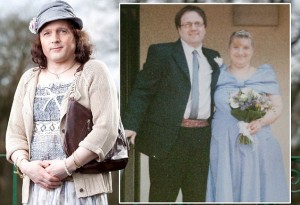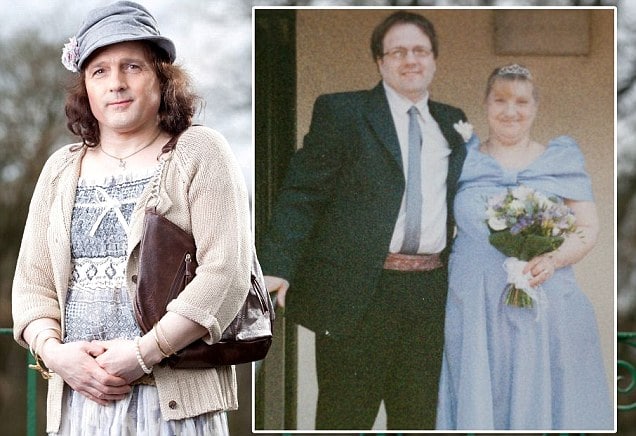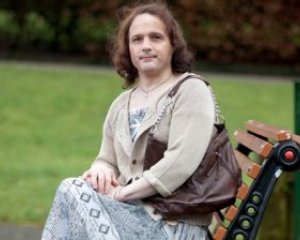A woman with both male and female sex organs lived as a man for over 40 years because her parents didn’t tell her she was born a hermaphrodite for two decades.
Caroline Kinsey has lived almost all her life as a man as her parents hid her intersex medical condition from her until she was 19.
She underwent surgery as an infant and was brought up as Carl John Baker.
But after years of mockery at school and assuming that ‘everybody’s body looked like hers’, her parents finally revealed the truth about her condition when she was 19.
After a short, failed marriage to a woman and a period suffering depression, Caroline decided to dress as a woman two years ago and now wants to take on a permanent ‘female persona’.

She said: ‘From being young I have always known I was different. I could never quite put my finger on why.
‘A doctor told my mother they should deny me my first birthright, the chance to be a woman, in favour of my second birthright, being a man,
‘The doctor said it would be easier to hide my female genitalia than the male one, so knowing no different that is what they did.
‘They were also advised to keep my secret from me and the rest of the world for as long as possible.’
Caroline was born in Bull Hill Hospital, Darwen, Lancashire, in 1968 to Monica and Rudolph Baker.
But, after her delivery, their good news was shattered when a nurse said their new baby daughter also had male genitalia.
Caroline was brought up as Carl John Baker in the family home, in Darwen.
In 1970, she and her younger brother Martin were taken into care after social workers discovered they had been left alone at the family home.
She added: ‘I had a really feminine sounding voice, but I was never told I was different to anyone else and I assumed everybody’s body looked like mine.
After turning 19, Caroline got back in touch with her family. She said: ‘I hadn’t been back long when mum said she was going to share something important with me.
‘She told me to sit down and she went and fetched my baby book. In there were pictures of me as a baby and details of my birth.
‘She started to tell me about the day she gave birth to me and the reaction by the nurse.
‘Everything all of a sudden started to make sense. My whole life people had sensed I was different.
‘She told me they went with the doctors’ advice because they didn’t know any better.’
Caroline continued to spend her life as a man, working in restaurants and pubs as a kitchen porter.
For a short period she also married, but the relationship broke up not long after they wed.
She found herself sinking into depression and, in a desperate act to feel better, she decided to try dressing as a woman two years ago.
She said: ‘To start off, it was really strange as I had only ever known how to dress as a man. But very quickly I realised it was the right thing for me.’
Caroline added that even now she struggles for acceptance in her new persona.
She said: ‘I grew up as a boy, which I shouldn’t have because secrets were kept from me.
‘I didn’t feel right in men’s clothes so after 41 years I decided to take a challenge and put women’s clothes on.
‘The first dress I wore was a pink dress when I walked to the job centre, a people started to stare and say, ‘what an idiot’.
‘But since that year I’ve started to wear women’s clothes because I knew I was a real woman.
‘I feel happier than ever now. I feel healthy and don’t even look back into my past because I don’t want to remember it.’
‘Many of its members accept me for me and can see how taking on my female persona has made be a more happy and balanced person, while others just want to be nasty all the time.
‘I am now looking into having surgery to remove my male genitalia forever.
‘Hopefully, this will enable me to put the past behind me and help me move on and find love.’
Campaigners for intersex groups say there are often public misunderstandings about the condition.
Dr Jay Hayes-Light, director of the UK Intersex Association, said: ‘Being intersex is not a lifestyle choice, but a medical condition.
‘Caroline’s case is typical of that of an a intersex child who had no idea about their condition.
‘The public often confuse intersex people with those who are transgender because of a lack of understanding.’
‘Discrimination against intersex people is often the unreported abuse of a minority, which has for generations been kept a secret by parents and other family members.
‘Gay people are now, rightly so, accepted into society and have a right to live as part of the community. Intersex people also deserve these same rights.
‘I back Caroline’s appeal for people to be more tolerant and hope people realise her condition has been inherited, not chosen.’
INTERSEX: NEITHER TOTALLY MALE OR FEMALE
The condition of being ‘Intersex’ affects one in every 5,000 births in Australia (although figures may be higher) and there are an estimated 10,000 intersex people in the land of Oz.
There are several known abnormalities that can lead to specific sexual ambiguity.
So called ‘XX male syndrome’ occurs in people who have two X chromosomes – one of which contains a significant amount of genetic material from a Y chromosome.
These people appear to be male, but are, in fact, genetically female. Typically, they will possess male sex organs, but these will often be underdeveloped.
They will also often develop breasts and maintain a high-pitched speaking voice.
In fact, biologists now recognise a host of conditions, both genetic and otherwise, which are labelled under the umbrella term ‘intersex’ – which replaces older terms such as ‘hermaphrodite’.
Intersex people may be genetically female, but physiologically male. Some will be true hermaphrodites, producing both eggs and sperm.
Many will have been subjected to ‘gender reassignment surgery’ after birth, sometimes successfully, often not.
by John Jackson



